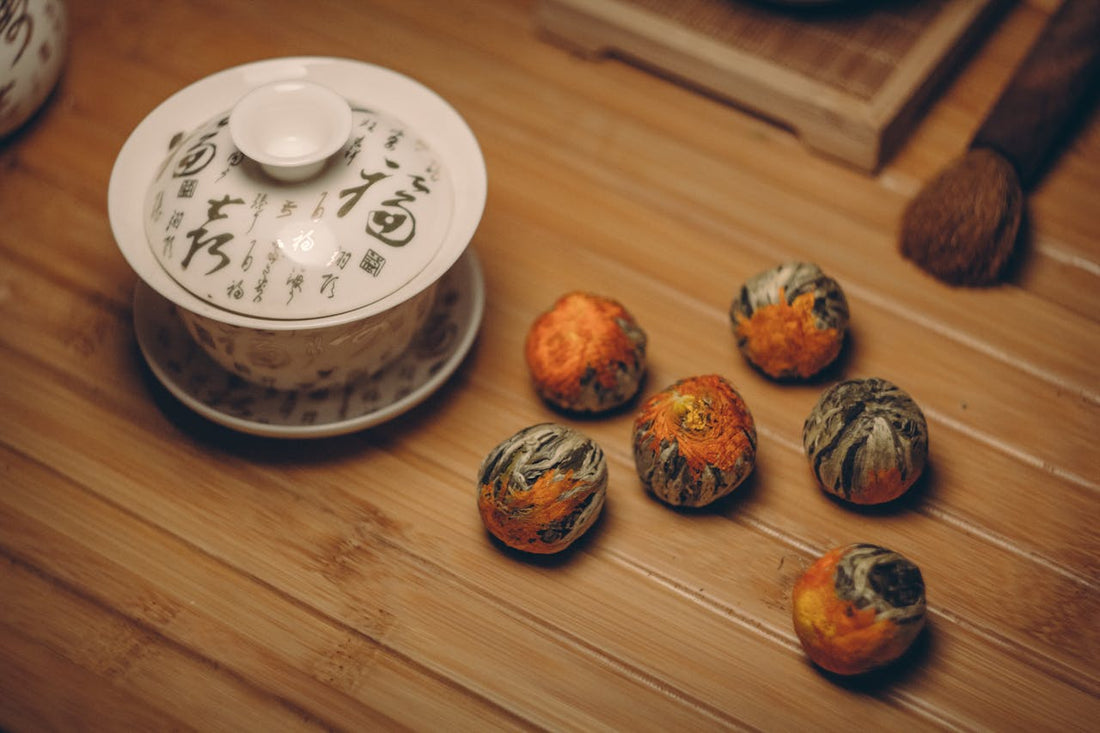
What is Jasmine Tea?
Jasmine tea is a fragrant and soothing tea made by infusing green, white, or black tea leaves with the delicate aroma of jasmine blossoms. Known for its calming properties and floral taste, jasmine tea has been cherished for centuries as a luxurious and aromatic beverage. Whether enjoyed on its own or paired with meals, jasmine tea offers a delightful sensory experience.
The Origins of Jasmine Tea
Jasmine tea has its roots in China, where it has been enjoyed since the Song Dynasty (960-1279). Traditionally produced in the Fujian province, jasmine tea was initially created by layering fresh jasmine blossoms over tea leaves to allow the flowers' natural oils to infuse the tea. Today, it remains one of the most popular flavoured teas worldwide, celebrated for its elegance and versatility.
How is Jasmine Tea Made?
The production of jasmine tea involves a meticulous process to ensure its distinctive flavour and aroma:
Harvesting the Tea Leaves: High-quality green, white, or black tea leaves are carefully picked and prepared.
Picking the Jasmine Flowers: Fresh jasmine blossoms are harvested in the early evening when their fragrance is at its peak.
Layering and Infusing: The flowers are layered over the tea leaves, allowing the natural oils to infuse the tea. This process may be repeated multiple times for a stronger jasmine flavour.
Drying and Sorting: The tea is dried to lock in the floral aroma, and any remaining jasmine petals are removed to ensure a smooth drinking experience.
What Does Jasmine Tea Taste Like?
Jasmine tea is celebrated for its light, floral flavour with a sweet and lingering finish. The base tea influences its taste: green tea offers a fresh and grassy undertone, white tea brings a delicate sweetness, and black tea adds depth and richness. This combination of tea and jasmine creates a harmonious and balanced brew that is both refreshing and aromatic.
Health Benefits of Jasmine Tea
Jasmine tea is not only delicious but also packed with potential health benefits:
Rich in Antioxidants: Jasmine tea contains polyphenols that help fight free radicals and support overall health.
Supports Heart Health: Regular consumption of jasmine tea may help reduce cholesterol levels and promote cardiovascular well-being.
Boosts Metabolism: The caffeine and catechins in jasmine tea can aid in weight management by boosting metabolism.
Reduces Stress and Anxiety: The soothing aroma of jasmine has calming properties that can help reduce stress and promote relaxation.
Improves Oral Health: Jasmine tea’s antibacterial properties can support healthy gums and freshen breath.
How to Brew Jasmine Tea
Brewing jasmine tea correctly is essential to enjoy its delicate flavour. Follow these steps:
Use Fresh Water: Heat fresh, filtered water to about 75°C–85°C (167°F–185°F).
Measure the Tea: Use 1 teaspoon (2 grams) of loose-leaf jasmine tea or 1 tea bag per cup of water.
Steep: Pour the hot water over the tea and let it steep for 2–4 minutes. Avoid over-steeping to prevent bitterness.
Serve: Enjoy plain to appreciate its floral aroma, or add a touch of honey for sweetness.
Why Choose Jasmine Tea?
Jasmine tea offers a perfect blend of tradition, flavour, and wellness. Its floral fragrance, calming properties, and health benefits make it an ideal choice for any occasion. Whether you’re enjoying a quiet moment of relaxation or hosting an elegant tea gathering, jasmine tea provides a refined and satisfying experience.
Frequently Asked Questions About Jasmine Tea
Q: Is jasmine tea caffeinated?
A: Yes, jasmine tea typically contains caffeine, with the level depending on the base tea used (green, white, or black).
Q: Can I drink jasmine tea before bed?
A: While jasmine tea has calming properties, its caffeine content may not be suitable for everyone before bedtime. Opt for a decaffeinated version if you are sensitive to caffeine.
Q: What’s the best way to enjoy jasmine tea?
A: Jasmine tea is versatile and can be enjoyed hot or iced. Pair it with light snacks or desserts for a delightful experience.
Disclaimer
This article is for informational purposes only and is not a substitute for professional medical advice. Always consult a healthcare professional before adding any new teas or supplements to your diet, especially if you are pregnant, nursing, have a medical condition, or are taking medication.
The Origins of Jasmine Tea
Jasmine tea has its roots in China, where it has been enjoyed since the Song Dynasty (960-1279). Traditionally produced in the Fujian province, jasmine tea was initially created by layering fresh jasmine blossoms over tea leaves to allow the flowers' natural oils to infuse the tea. Today, it remains one of the most popular flavoured teas worldwide, celebrated for its elegance and versatility.
How is Jasmine Tea Made?
The production of jasmine tea involves a meticulous process to ensure its distinctive flavour and aroma:
Harvesting the Tea Leaves: High-quality green, white, or black tea leaves are carefully picked and prepared.
Picking the Jasmine Flowers: Fresh jasmine blossoms are harvested in the early evening when their fragrance is at its peak.
Layering and Infusing: The flowers are layered over the tea leaves, allowing the natural oils to infuse the tea. This process may be repeated multiple times for a stronger jasmine flavour.
Drying and Sorting: The tea is dried to lock in the floral aroma, and any remaining jasmine petals are removed to ensure a smooth drinking experience.
What Does Jasmine Tea Taste Like?
Jasmine tea is celebrated for its light, floral flavour with a sweet and lingering finish. The base tea influences its taste: green tea offers a fresh and grassy undertone, white tea brings a delicate sweetness, and black tea adds depth and richness. This combination of tea and jasmine creates a harmonious and balanced brew that is both refreshing and aromatic.
Health Benefits of Jasmine Tea
Jasmine tea is not only delicious but also packed with potential health benefits:
Rich in Antioxidants: Jasmine tea contains polyphenols that help fight free radicals and support overall health.
Supports Heart Health: Regular consumption of jasmine tea may help reduce cholesterol levels and promote cardiovascular well-being.
Boosts Metabolism: The caffeine and catechins in jasmine tea can aid in weight management by boosting metabolism.
Reduces Stress and Anxiety: The soothing aroma of jasmine has calming properties that can help reduce stress and promote relaxation.
Improves Oral Health: Jasmine tea’s antibacterial properties can support healthy gums and freshen breath.
How to Brew Jasmine Tea
Brewing jasmine tea correctly is essential to enjoy its delicate flavour. Follow these steps:
Use Fresh Water: Heat fresh, filtered water to about 75°C–85°C (167°F–185°F).
Measure the Tea: Use 1 teaspoon (2 grams) of loose-leaf jasmine tea or 1 tea bag per cup of water.
Steep: Pour the hot water over the tea and let it steep for 2–4 minutes. Avoid over-steeping to prevent bitterness.
Serve: Enjoy plain to appreciate its floral aroma, or add a touch of honey for sweetness.
Why Choose Jasmine Tea?
Jasmine tea offers a perfect blend of tradition, flavour, and wellness. Its floral fragrance, calming properties, and health benefits make it an ideal choice for any occasion. Whether you’re enjoying a quiet moment of relaxation or hosting an elegant tea gathering, jasmine tea provides a refined and satisfying experience.
Frequently Asked Questions About Jasmine Tea
Q: Is jasmine tea caffeinated?
A: Yes, jasmine tea typically contains caffeine, with the level depending on the base tea used (green, white, or black).
Q: Can I drink jasmine tea before bed?
A: While jasmine tea has calming properties, its caffeine content may not be suitable for everyone before bedtime. Opt for a decaffeinated version if you are sensitive to caffeine.
Q: What’s the best way to enjoy jasmine tea?
A: Jasmine tea is versatile and can be enjoyed hot or iced. Pair it with light snacks or desserts for a delightful experience.
Disclaimer
This article is for informational purposes only and is not a substitute for professional medical advice. Always consult a healthcare professional before adding any new teas or supplements to your diet, especially if you are pregnant, nursing, have a medical condition, or are taking medication.
